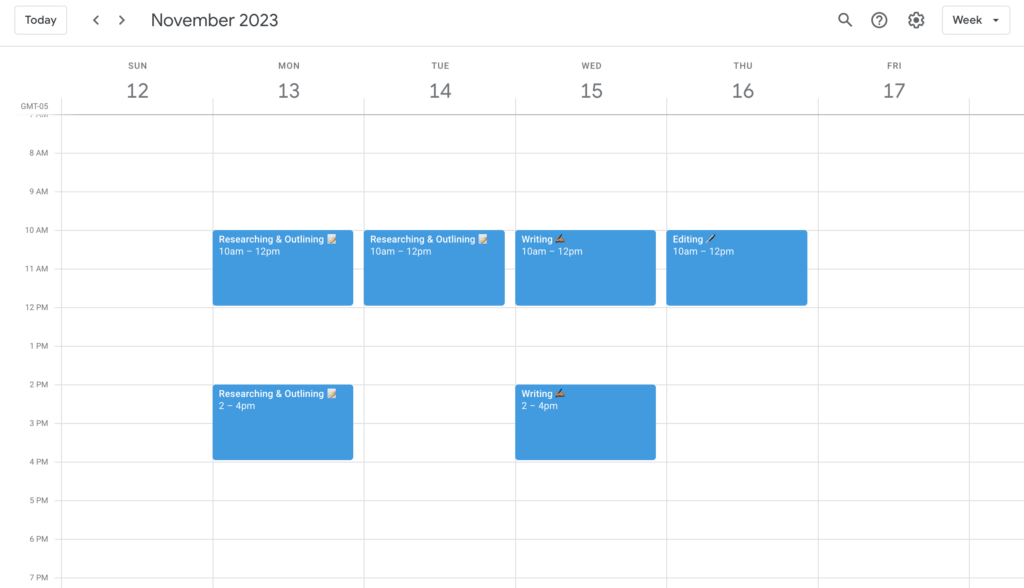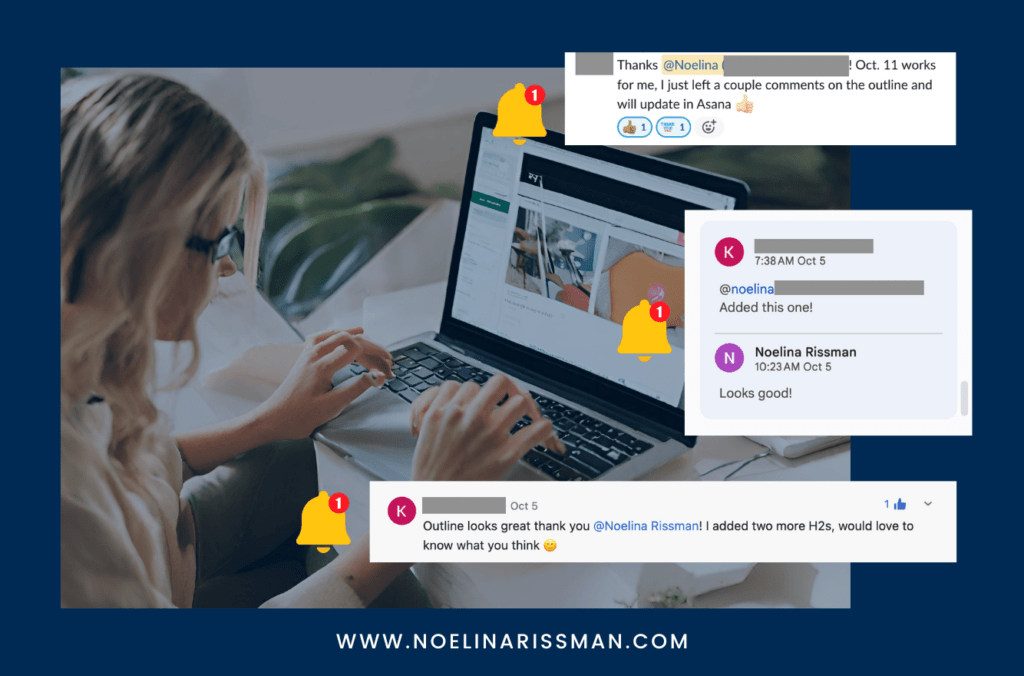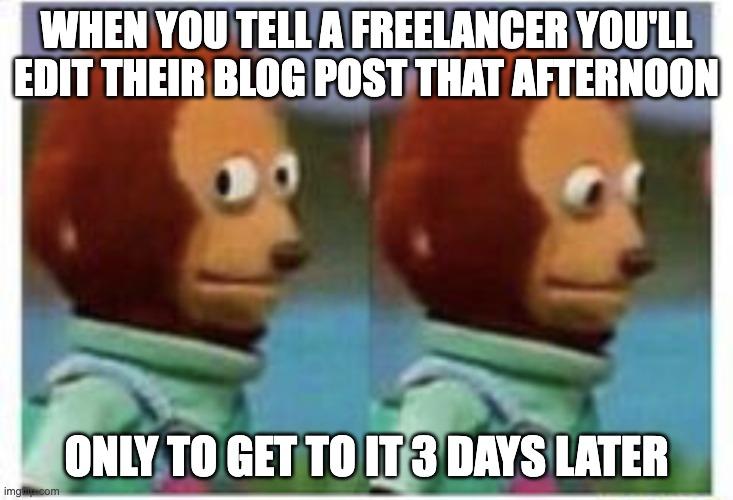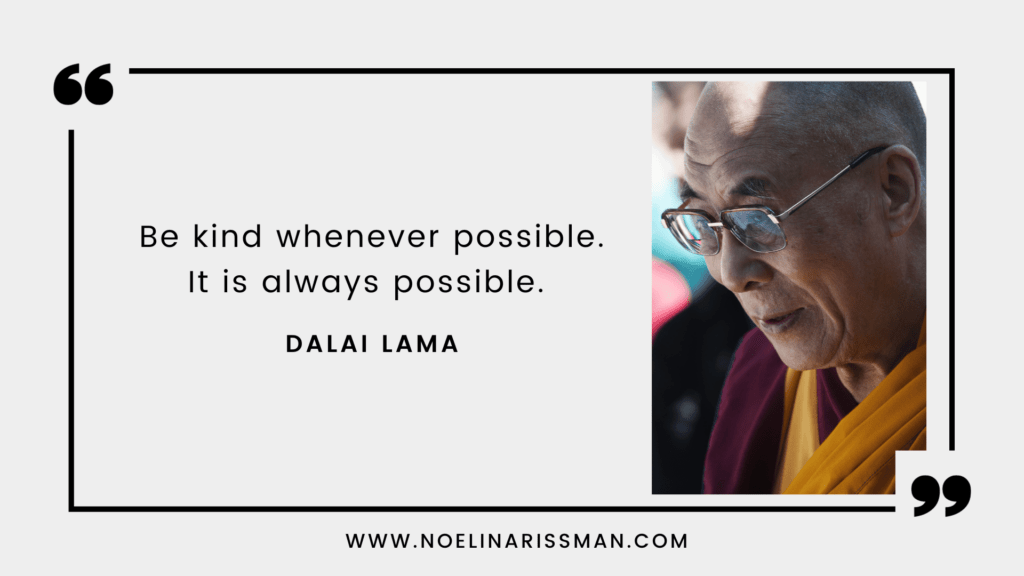Overview
- Developing soft skills like dependability, strong communication chops, attention to detail, and curiosity will help content writers outshine AI.
- Discover real-life examples of what these skills look like and how you can hone them, coming from a Senior Content Marketing Manager.
ChatGPT has leveled the content writing playing field, meaning (and I hate to be the one to break it to you if you haven’t realized it yet): We’ve entered an age where the quality of your work won’t always cut it. How you work and make others feel just might.
Introducing: people skills, quite possibly your saving grace from the rise of AI tools.
I say this not as a spectator, yet as a Senior Content Marketing Manager and someone who’s been hiring and retaining freelance content writers for years strictly because of how easy it was to work with them. (Exhibit A below, of one of my old LinkedIn posts.)
Here are the soft skills I believe content writers should develop (and how) to increase their perceived value — and stand a fighting chance continuing their career in years to come.
Table of Contents
The top 7 soft skills content writers need in the age of AI
Master these people skills, and you’ll make working with you a no-brainer in times of increased budget cuts, emergence of trending AI tools, and the like.
At the beginning of each section, you’ll notice a canned ChatGPT response. I asked the AI tool to weigh in on the different soft skills and their importance in client work. (Yes, I consulted ChatGPT for this blog. Yes, it’s ironic given the topic.)
1. Dependability
ChatGPT’s take: “Dependability is the cornerstone of a successful freelance writing career, and it plays a pivotal role in securing repeat work from clients. In the competitive world of freelancing, clients are not just seeking skilled writers; they are also looking for professionals who can consistently deliver quality work on time. Meeting deadlines is crucial in the fast-paced environment of content creation, where timely delivery can make the difference between a successful project and a disappointed client.”
My take as a real-life content manager: To stay competitive, consistently deliver high-quality work on time, every time. This means meeting — better yet, beating — deadlines. (If this seems like an obvious soft skill for content writers, you’d be surprised…)
Have a hard time doing this? Time blocking works well. Let’s look at a simplified example of how to time block.
Imagine it takes you 12 hours to write one long-form blog post about a topic you have some expertise in. You spend six hours researching and outlining, three hours spent writing, and three hours editing. For maximum efficiency, you could break these tasks into two-hour time blocks spread across several days. (Pro tip: Work when you’re more productive.)

My parting words as a content manager with boots on the ground? Content teams often run a tight ship. Missing one deadline can be akin to detonating a mine. It can wreak havoc across the execution of a perfectly planned marketing campaign.
As the content writer, do you want to be the one who sets that off? Didn’t think so.
2. Strong communication skills
ChatGPT’s take: “Effective communication is a linchpin for success in the realm of freelance content writing. Clear and frequent communication at every stage of the project not only ensures that the writer and client are on the same page, but also serves as a proactive measure to address any questions or concerns that may arise. Establishing open lines of communication from the outset creates an environment of transparency, fostering a collaborative relationship between the freelance writer and the client.”
My take as a real-life content manager: Communicate clearly and often to all stakeholders involved at every stage of the project. If you’re working with international clients, take their time zones into consideration — i.e., if you’re 5 hours behind the client, finishing the first draft by EOD your time could mean they won’t have time to look at it until they’re back online the following day.
Personally, I’m a fan of what many would consider over-communication. On a daily basis, I’m barraged by notifications from at least a dozen tools. So, I encourage team members and writers to notify me of activity across platforms. In the mock image below, this meant a writer pinging me on Slack, messaging me in Asana, and flagging me in the Google Doc for specific feedback.

Here are some more tips to streamline communication from day 1:
- Decide on communication tools. Which communication tools will you use, and for what purpose? Are final deliverables to be turned into Google Drive? Should you ping the client on Slack if any questions come up, or do they prefer email? Will you be required to use Asana or another project management tool? Clear this all up before beginning.
- Set office hours. Ensure the client understands your working hours and time zone so all parties involved know when to contact you. A quick hack is to add working hours to your email signature (so they see it even before you sign the contract) as well as to set them in Google Calendar.
- Respond promptly. When they fall within office hours, quick responses demonstrate professional courtesy. Personally, I’m always pleased when freelancers respond to my content request within one business day, and delighted when it’s within a couple hours.
- Check for appropriate document permissions early. Preferably, this is as soon as the client sends you links. The digital walk of shame is asking for those permissions mere days before the deadline.
- Communicate with context. Misunderstandings often occur when work spans countries, cultures, time zones, etc. To avoid confusion, communicate with context. Need an extra day to edit because the electricity went out for half a day? Let the client know ahead of time, along with the new deadline. Having a hard time getting your thoughts down on paper? Get visual, or ask your client to hop on a quick huddle or video chat.
3. Attention to detail
ChatGPT’s take: “In the competitive landscape of content creation, where readers are discerning and quick to judge, content writers who demonstrate a strong attention to detail are more likely to produce material that not only meets but exceeds expectations. This skill not only elevates the quality of the content but also contributes to the writer’s professional reputation, setting the stage for success in the ever-evolving world of freelance writing.”
My take as a real-life content manager: I notice when writers repeat the same mistakes despite being given clear instructions and advice. The first few instances I often let slide. (After all, we’re only human.) But continuous mishaps without further context become problematic.
Ensure proper grammar, spelling, and punctuation as well as formatting and styling. Intentional errors are welcome — e.g., the sentence fragments I use throughout this blog. But ensure they’re used strategically.
You also need to go beyond technicalities to put the substance of your content to the test, which means:
- Verifying facts
- Presenting coherent arguments
- Citing sources appropriately
Having trouble with your proofreading and editing processes? Try Grammarly, Hemingway Editor, ProWritingAid, or other tools to catch any oversights. Or keep an editing checklist on hand for self-editing.
4. Curiosity
ChatGPT’s take: “Curiosity is a vital trait for content writers as it fuels a continuous quest for knowledge and understanding. In the ever-evolving landscape of information, a curious writer is more likely to stay abreast of industry trends, emerging topics, and diverse perspectives. This inherent inquisitiveness enables writers to produce content that is not only relevant but also engaging and insightful.”
My take as a real-life content manager: If there’s one motto I hold dear to my content marketing heart, it’s this: Always be learning.
It’s the curious writers who ask the right questions during SME interviews, turning stones previously left unturned to reveal more interesting angles. It’s the curious writers who stay abreast of industry trends and emerging topics, weaving them into client content when possible. It’s the curious writers who seek diverse perspectives and challenge assumptions, even if doing so unearths unconventional ideas that are contrary to the narrative they’re trying to push.
And it’s the curious writers who not only take client briefs and run with them, but think critically about the context of the topic as a whole and how it can be improved based on what they know (and don’t know) about the product and industry.
Curiosity is a driving force behind creativity. It prompts writers to proactively uncover nuanced details that add depth and authenticity to their work. By creating content filled with new ideas, diverse opinions, and fresh angles, they prevent their content from being stale or predictable — like the SEO soup ranking in top search results.
5. Receptive to feedback
ChatGPT’s take: “Receptiveness to feedback is a critical soft skill for freelance writers, integral to their professional growth and success. Being open to feedback indicates a willingness to learn and adapt, which is essential in a field that constantly evolves with new trends, technologies, and audience preferences. Freelance writers who actively seek and embrace constructive criticism can refine their craft, produce higher-quality work, and better meet the expectations of their clients. This adaptability not only enhances the final product but also demonstrates a commitment to continuous improvement, a trait that clients highly value.”
My take as a real-life content manager: I can always tell the difference between writers who are “open to feedback” (claiming they are, but really aren’t), and those who are genuinely eager to receive feedback.
Those who are open to feedback accept my suggested edits in their Google Doc — seemingly out of obligation. They don’t question my editorial decisions, even if they have more expertise in the topic at hand and think certain sections should be approached differently.
On the other hand, those who are truly receptive to feedback will ask about edits made and be willing to open up the conversation when defining the direction in which the content should go. (And the really good writers keep my feedback in mind for future pieces, cutting down any future revision time.)
I believe a certain level of openness is vital for all parties involved. But better working relationships are built upon genuine eagerness to learn and grow together to achieve a common end goal.
6. Patience
ChatGPT’s take: “By maintaining a patient approach, content writers not only demonstrate professionalism but also contribute to the development of trust and rapport with clients, ultimately leading to more successful and enduring working partnerships.”
My take as a real-life content manager: Content leads, managers, and directors wear a lot of hats.
In my current role as Senior Content Marketing Manager, I handle content strategy and writing across the funnel (think: blog posts, case studies, one pagers, two pagers, ebooks, emails, etc.). But on any given day, I could also be tasked with:
- Adjusting Asana projects based on changing timelines
- Tracking analytics across content assets, especially top-performing ones
- Updating our editorial calendar for ad-hoc content requests
- Following up with emails from external contractors (freelancers, PR agency, etc.)
- Reviewing email and landing page copy for Brand and product technicalities
- Creating systems and processes to make current content operations run smoothly
This list isn’t exhaustive.
So, when it takes a content manager two to three business days to get back to you, trust me when I say they didn’t forget about you. Just be patient… And feel free to follow up after day 3. 🙂

7. Empathy
ChatGPT’s take: “Content writers should be empathetic when working with clients because it fosters strong, positive relationships and enhances collaboration. By understanding the client’s perspective, writers can better align their work with the client’s vision and goals, leading to higher satisfaction. Empathy improves communication, ensuring clients feel heard and respected, and helps address misunderstandings constructively. This approach also builds trust and loyalty, making clients more likely to return and recommend the writer. Ultimately, empathy enhances both the quality of the work and the writer’s professional reputation.”
My take as a real-life content manager: Empathetic was the freelance content writer who sent me a photobook so I could capture all my favorite travel memories to come. Empathetic was the other who included the perfect metaphor in their content.
Yes, being empathic helps you connect with clients better, keeping you top-of-mind when their freelance roster opens up. But just as important, empathy also helps writers create more relatable content that fosters a stronger, priceless connection between audience and brand.
So, the next time you sit down to write a piece or reach out to the client about something, think: If I were in their shoes, how would I feel with [insert situation]? What can I do to show that we’re on the same page and that I understand them?
How content writers can develop these soft skills
Soft skills don’t come easy as 1, 2, 3? Here are some tips.
Be consistent
ChatGPT’s take: “Consistency in developing soft skills ensures that writers can adapt to the changing demands of their roles. The ability to communicate effectively, collaborate seamlessly, and embrace new challenges becomes increasingly vital in a professional landscape where the only constant is change. By consistently investing in their soft skills, content writers position themselves as adaptable and forward-thinking professionals who are well-equipped to navigate the complexities of the ever-evolving content creation landscape.”
My take as a real-life content manager: Habits often take longer than 21 days to develop. Likewise, honing your soft skills isn’t an overnight endeavor.
If your goal is to be more dependable, turn in all deliverables on time next week, followed by next month, and then for the entire quarter. Having a hard time making that happen? Track your time doing projects with a tool like Toggl. Then, time block accordingly. (If you’re still struggling to make deadlines, revisit your workload. You may be over capacity.)
When in doubt, choose kindness
ChatGPT’s take: “Being kind is not only a humane and ethical approach but also a pragmatic one for freelance content writers. It positively impacts client relationships, communication, reputation, client satisfaction, and overall professionalism, all of which are critical components of a successful freelance writing career.”
My take as a real-life content manager: Dalai Lama said it best: “Be kind whenever possible. It is always possible.”

Yes, it’s difficult to manage situations where things have been inadvertently taken out of context. Also yes, true emotions are often masked when we interact with people through screens.
Marry this with the fact that personal lives often blend into our professional lives, and you’re left with making (educated?) guesses about why people do what they do, when they do it. And then doing your best to handle the situation as best you can professionally.
Being human is a fickle experience.
While our increasingly digital world makes it more difficult to approach situations from a place of kindness, it’s not impossible. Here’s what it could look like:
Approaching disagreements from a place of curiosity instead of defensiveness.
Giving well-standing clients extra time they may need to get back to you with their edits when you know they’re currently very busy.
Sending your main POC a small gift when you know of an upcoming, major life event (made easier by sites like Goody, SnackMagic, and Giftly).
Make soft skills your competitive advantage as a content writer — despite AI advancements
As a content writer, dominating soft skills are the cherry on top of turning in high-quality, publish-ready work. Having the ability to work well with humans makes clients more likely to return for future projects and recommend you to others within their professional networks.
This increases the chances of landing new projects via word-of-mouth, which could ensure a steady stream of repeat work without needing to rely solely on outbound prospecting.

And who doesn’t want that??
